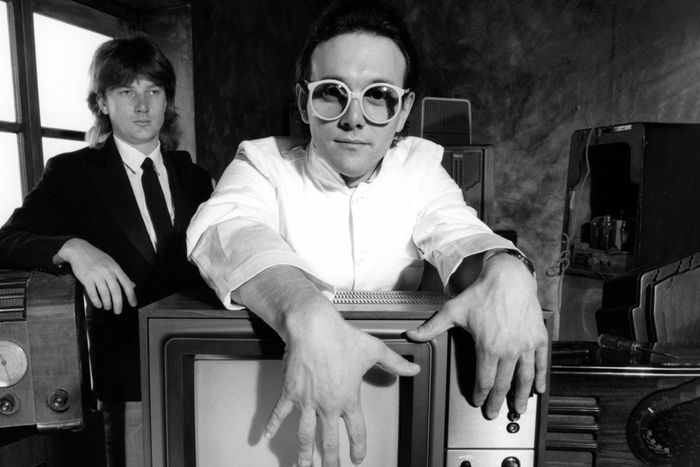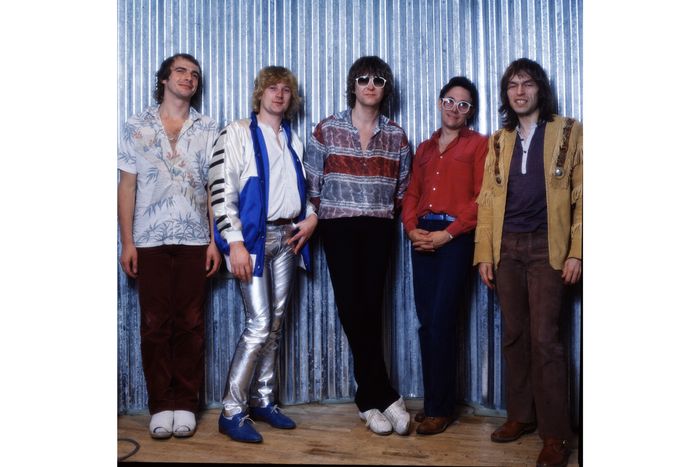Save this article to read it later.
Find this story in your accountsSaved for Latersection.
Some artists simply reflect their era.

Others, like Trevor Horn, manage to anticipate the next one.
Small wonder journalists came to call him the man who invented the 80s.
True to its title, the tome offers invaluable insights into his techniques, sensibility, and style.

I think a lot of my ideas for how things should sound are out of date.
One key thing your book illuminates is the sharp distinction between a song and a record.
In a nutshell, whats the difference?A song is just a blueprint.
A record is the final product youre going to use to sell that song.
Quite often when youre a producer you get a demo of a song and its very basic.
Then you have to arrange the song and create sounds for it.
That in itself can be quite a trip.
I feel like each record is a battle.
It should make you feel like youve had an experience.
Originally, Crazy just had a verse and a chorus and a drum break.
I kept feeling like it needed something more.
I thought that was a really good lyric.
When I got that bit I thought,Wow, Ive finally got the record.
Your longest-lasting professional relationship has been with Seal.
But the record labels didnt get him at first.
How come?Somebody said, a Black guy who sounds like Peter Gabriel, thats not commercial.
They completely missed what was going on.
When I heard him sing, I thought it was the best vocal Id ever heard.
I knew hisfirst songwas going to be a big record because it was so emotive.
What a great fucking line!
The bass was a particular problem.
Thats when Elvis came in and said, Youarentstillworking on that bass part, are you?
But when the song came out, it was No.
1 in England for nine weeks, so clearly, we were after something.
When were you first aware of your special attention to sound?I always listened very intently to records.
I realized that it takes a very long time to understandhowto listen to what youre hearing.
I loved everything about trying to figure out how they were doing it.
What was that moment?We had written a song called Baby Blue that was covered by Dusty Springfield.
We made this very quirky rhythm track and it really bounced along.
They should have put Dusty on our demo!Our version sounded so weird and different for 1978.
At the time the prevailing sound was classic rock and punk.
What brought you to the realization that the future lay elsewhere?By listening toMan Machineby Kraftwerk.
Then I heard Donna Summers I Feel Love.
I was spending every night in places where people danced.
It was the kind of thing a hotel piano player would use.
Actually, on Video Killed the Radio Star, there isnt a sequencer on it.
We would always say, Thats what we want!
Did you envision something like MTV coming?No.
My head was all in J.G.
Ballard and the other sci-fi stuff I was reading.
I could see that some day people would sit with computers and invent groups.
That was what the Buggles were meant to be a silly pop group invented by somebody on a computer.
At the start, it was a new art form and I would watch it.
Yet, associations to MTV are part of why you became known as the man who invented the 80s.
I tried to refute that but after 20 interviews where youre asked about it, you give up.
The fact is, I was lucky.
I was first into a big field that nobody had been into.
Here were all these new tools and no one was really using them.
Every day I found something new to try.
One person who did some technical work on Radio Star was a 23-year-old Hans Zimmer.
Hans was a charmer, but I couldnt see him in the pop-music world.
He was a lot more comfortable when he went into film, and hes been amazing at it.
It was already aterrific-sounding record.
When I took it on, my motto was Im not going to spoil any of this.
But there was no multi-track of the recording, so I couldnt change the mix.
Youve got to be so careful not to mangle things.
But it did really well.
The idea that AI would make creative decisions in music doesnt appeal to me at all, though.
And the idea that AI can make anybody sound like anybody isnt really true.
The problem is, I dont phrase even remotely like Elvis Presley, so it doesnt work.
Maybe you could teach AI that, but who knows?
In 1980, when Yes frontman Jon Anderson was forced out, they asked you to take over.
That move was recently included in aRolling Stonelistof the 50 Worst Decisions in Music History.
What say you?I really didnt want to do it.
I knew that I was nowhere as good as Jon Anderson.
They really pushed me into it because they had a sold-out tour that they needed to get through.
For me it was just a thing of,Are you really going to say no?
This is the kind of thing that happens once in a lifetime.
I did my best.
The way I looked at it was, its either Yes with me, or no Yes.
So, put up with me and listen to what great musicians they are!
After the tour, Yes fired you.
Being a huge Yes fan yourself, do you see that point of view?Of course!
I think90125is a good album but its not the best Yes album by a long shot.
You worked with Paul McCartney on one of his better solo albums,Flowers in the Dirt.
But when he wanted to work with you again, the scheduling wasnt right, so you demurred.
And as you note in the book, he didnt take it well.
How did it feel to have a Beatle lose his shit on you?[Laughs.
].I could see why he was pissed off because he had enjoyed himself the previous time.
But even when youre a Beatle, ultimately youre just a bass player and singer and songwriter.
Id be more worried if it was Vladimir Putin screaming down the phone at me.
But he wasnt into the original idea.
Why?I think it horrified him that Rod would sing the song.
He liked even less the idea of Rod doing his Waltzing Matilda.
At that moment in time, Rod wasnt everybodys cup of tea.
Downtown Train was the beginning of a way back for him.
Certainly, Rod got the song to loads of people who never would have heard it.
When I first heard her sing on the mic, I was in awe.
I asked her, Where did you learn to sing like that?
She told me that she was leading her own band when she was 11.
It didnt come out of nowhere.
You did get to work with a great artist we lost this last year, Sinead OConnor.
What are your memories of her?We did asongfor the end of the movieVeronica Guerin.
It was a beautiful song, and I wrote the lyrics.
What I remember was that thedirectorhadnt liked them very much.
But the first thing Sinead said to me was, I fookin love the lyrics!
Its a really great song!
I said, Darling, I love you.
And she was terrific on it.
Im so sad that she passed so young.
She was a troubled soul, but she had the most beautiful voice.
It happens so rarely now to have a group of people playing together.
Something is lost when its just you and somebody else on a workstation.
Whenever things change, something is lost and something is gained.
Thats true in recording and in life too.
This interview has been edited and condensed.